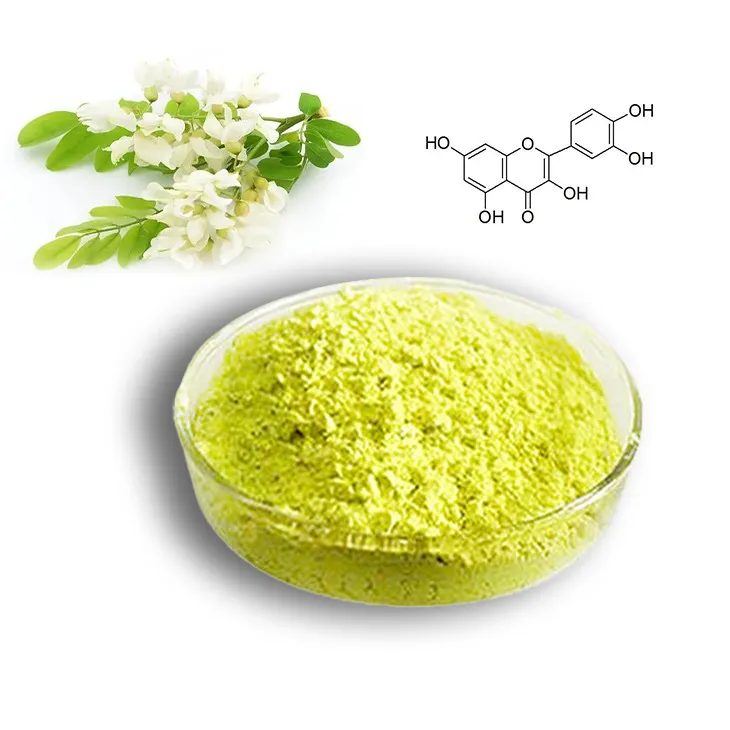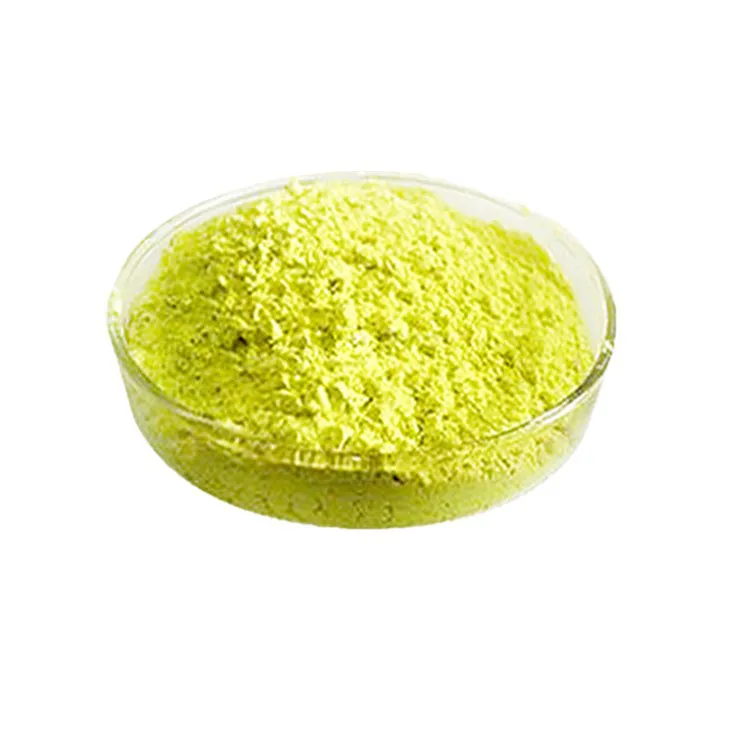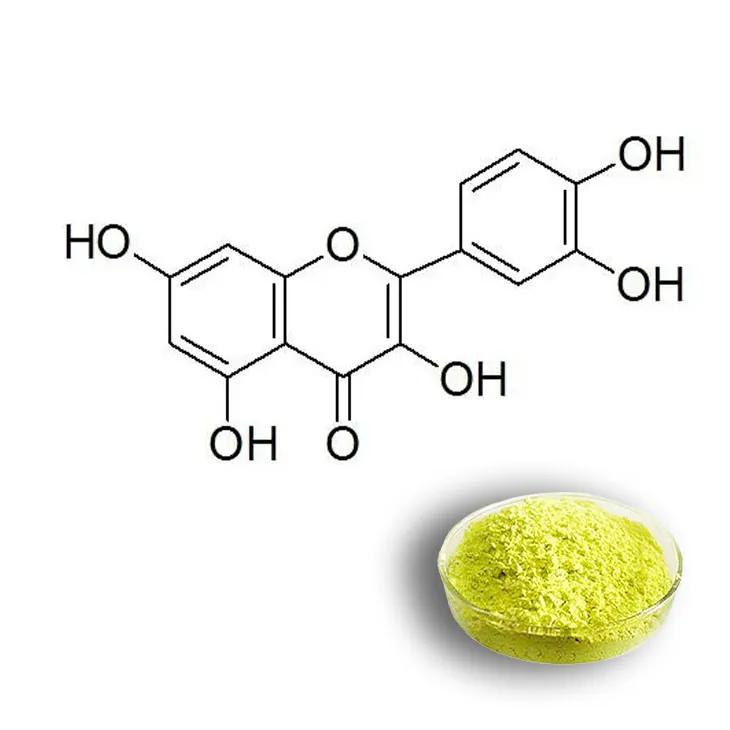- 0086-571-85302990
- sales@greenskybio.com
Understand Quercetin's Private Label: A Comprehensive Guide
2024-12-11

1. Introduction to Quercetin
Quercetin is a natural compound that belongs to the flavonoid family. Flavonoids are a diverse group of polyphenolic compounds found in plants. Quercetin is one of the most abundant flavonoids in the human diet and has been the subject of extensive scientific research due to its potential health - promoting properties.

2. Sources of Quercetin
2.1 Fruits
- Apples are a well - known source of quercetin. The peel of apples contains a relatively high amount of this flavonoid. - Berries such as cranberries, blueberries, and strawberries also contain quercetin. These colorful fruits are not only delicious but also rich in other beneficial nutrients.
2.2 Vegetables
- Onions are a significant source of quercetin, especially the outer layers. - Leafy greens like kale and spinach also contain quercetin, along with a host of other vitamins and minerals. - Broccoli is another vegetable that contains this important flavonoid.
2.3 Supplements
In addition to obtaining quercetin from natural food sources, it is also available as a dietary supplement. These supplements are often in the form of capsules or tablets. However, it is important to note that when choosing a supplement, one should look for a reliable brand to ensure quality and purity.

3. Health Benefits of Quercetin
3.1 Antioxidant Properties
Quercetin acts as a powerful antioxidant. It helps to neutralize free radicals in the body. Free radicals are unstable molecules that can cause damage to cells, proteins, and DNA. By scavenging these free radicals, quercetin can help protect the body from oxidative stress, which is associated with various chronic diseases such as heart disease, cancer, and neurodegenerative disorders.
3.2 Anti - inflammatory Effects
Chronic inflammation is a key factor in many diseases. Quercetin has been shown to have anti - inflammatory properties. It can inhibit the production of inflammatory mediators in the body, such as cytokines and prostaglandins. This anti - inflammatory action may help in conditions like arthritis, asthma, and inflammatory bowel disease.
3.3 Potential Anti - cancer Properties
Although more research is needed, there is evidence to suggest that quercetin may have anti - cancer properties. It may act at different stages of cancer development, including inhibiting the growth and spread of cancer cells. Some studies have shown that quercetin can induce apoptosis (programmed cell death) in cancer cells while leaving normal cells unharmed. However, it should not be considered a sole treatment for cancer, but rather a potential complementary approach.
3.4 Cardiovascular Health
Quercetin may also benefit cardiovascular health. It can help lower blood pressure by relaxing blood vessels. Additionally, it may improve lipid profiles by reducing levels of LDL (bad) cholesterol and triglycerides while increasing HDL (good) cholesterol. These effects can contribute to a reduced risk of heart disease.
3.5 Immune System Support
By enhancing the antioxidant and anti - inflammatory status of the body, quercetin can also support the immune system. It may help the body defend against infections by boosting the function of immune cells.

4. How Quercetin Functions at the Cellular Level
At the cellular level, quercetin exerts its effects through multiple mechanisms. It can interact with various cellular signaling pathways. For example, it can modulate the activity of kinases, which are enzymes involved in cell signaling. By doing so, it can regulate cell growth, differentiation, and survival. Quercetin can also affect the expression of genes involved in antioxidant and anti - inflammatory responses. It can bind to specific DNA - binding proteins and influence the transcription of these genes, leading to increased production of antioxidant and anti - inflammatory molecules within the cells.

5. Recommended Dosage of Quercetin
The recommended dosage of quercetin can vary depending on several factors, such as the individual's age, health status, and the purpose of supplementation. In general, for general health promotion, a daily dose of 500 - 1000 mg may be sufficient. However, for specific health conditions, higher doses may be required under the guidance of a healthcare professional. It is important to note that excessive intake of quercetin may cause side effects such as stomach upset, so it is always best to start with a lower dose and gradually increase if necessary.
6. Conclusion
Quercetin is a remarkable flavonoid with a wide range of potential health benefits. From its antioxidant and anti - inflammatory properties to its possible role in cancer prevention and cardiovascular health, it offers many opportunities for improving well - being. However, while it can be obtained from a variety of food sources, those considering supplementation should do so with caution and under the advice of a healthcare provider. Understanding quercetin and its private label can empower individuals to make informed decisions about their health and potentially incorporate this beneficial compound into their daily routine.
FAQ:
What are the main sources of quercetin?
Quercetin can be found in a variety of fruits and vegetables. Some of the common sources include apples, onions, berries (such as blueberries and strawberries), citrus fruits, and leafy greens like spinach. It is also available in supplement form for those who may not be able to get enough from their diet alone.
What are the antioxidant benefits of quercetin?
As an antioxidant, quercetin helps to neutralize free radicals in the body. Free radicals are unstable molecules that can cause damage to cells, DNA, and proteins. By scavenging these free radicals, quercetin can reduce oxidative stress, which is associated with various chronic diseases, aging, and inflammation.
How does quercetin exhibit anti - inflammatory properties?
Quercetin inhibits certain enzymes and signaling pathways involved in the inflammatory response. It can suppress the production of inflammatory mediators such as cytokines and prostaglandins. This helps to reduce inflammation in the body, which is beneficial for conditions like arthritis, asthma, and cardiovascular diseases where inflammation plays a role.
What is the evidence for quercetin's potential anti - cancer properties?
Some studies in vitro and in animal models have shown that quercetin may have anti - cancer effects. It can interfere with cancer cell growth, induce apoptosis (programmed cell death) in cancer cells, and inhibit angiogenesis (the formation of new blood vessels that tumors need to grow). However, more research, especially in human clinical trials, is needed to confirm these potential anti - cancer benefits.
What is the recommended dosage of quercetin for optimal results?
The recommended dosage of quercetin can vary depending on factors such as age, health status, and the purpose of taking it. In general, for general health maintenance, doses in the range of 500 - 1000 mg per day are often suggested. However, it is always best to consult a healthcare provider before starting any new supplement regimen.
Related literature
- Quercetin: A Flavonoid with Multiple Health Benefits"
- "The Role of Quercetin in Cellular Function and Disease Prevention"
- "Quercetin Supplementation: Efficacy and Safety Considerations"
- ▶ Hesperidin
- ▶ citrus bioflavonoids
- ▶ plant extract
- ▶ lycopene
- ▶ Diosmin
- ▶ Grape seed extract
- ▶ Sea buckthorn Juice Powder
- ▶ Beetroot powder
- ▶ Hops Extract
- ▶ Artichoke Extract
- ▶ Reishi mushroom extract
- ▶ Astaxanthin
- ▶ Green Tea Extract
- ▶ Curcumin Extract
- ▶ Horse Chestnut Extract
- ▶ Other Problems
- ▶ Boswellia Serrata Extract
- ▶ Resveratrol Extract
- ▶ Marigold Extract
- ▶ Grape Leaf Extract
- ▶ blog3
- ▶ Aminolevulinic acid
- ▶ Cranberry Extract
-
What is Cranberry Extract Good For?
2024-12-11
-
What Organ Is Cranberry Good For?
2024-12-11
-
Green coffee bean Extract
2024-12-11
-
Curcuma Longa Extract/Turmeric extract
2024-12-11
-
Artichoke Extract
2024-12-11
-
Berberis aristata Extract
2024-12-11
-
Lemon Extract
2024-12-11
-
Scutellaria Extract
2024-12-11
-
Okra Extract
2024-12-11
-
Lavender Extract
2024-12-11
-
Epimedium extract powder
2024-12-11
-
Cat Claw Extract
2024-12-11


























